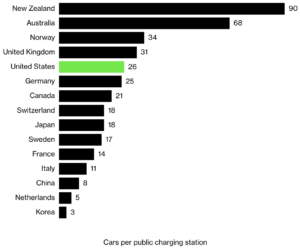Environment: Carbon capture and storage – what’s the real goal?
November 17, 2024
Carbon capture and storage fails to deliver carbon but succeeds for governments and industry. The pros and cons of reducing your personal carbon footprint. How best to tackle Australia’s land clearing loopholes.
Carbon capture and storage is not the solution
Kevin Morrison has succinctly summed up the carbon capture and storage (CCS) con trick being pulled on us by the fossil fuel industry and governments around the world, including our own:
‘… global energy-related CO2 emissions rose by 410 million tonnes (mt) to reach a new high of 37.4 billion tonnes in 2023. Given that it has taken around 50 years to capture less than 10mt per annum of CO2, it is going to take a heroic technical effort to meaningfully reduce the 37 billion tonnes of CO2 being pumped into the atmosphere each year, and a gargantuan sum of money to build the CCS facilities. Chevron and its Gorgon CCS partners have invested more than AU$3.2 billion in the Gorgon CCS project to bury a total of around 9.5mt of CO2, which equates to a cost of AU$336.8 to bury a tonne of CO2. Apply that to the 37 billion tonnes of CO2 of energy-related emissions each year, and the cost is in the trillions.’
… but oil and gas companies keep promoting the fantasy
Despite the evidence, which they are fully aware of, fossil fuel companies have been playing a canny game on CCS. Publicly they bignote their ‘successes’ with CCS so far, even though not one CCS project worldwide has ever reached its CO2 capture target. And they shout about its future promise for not only for their own activities but also for transport and industry more generally (‘see how the work we’re doing on CCS will help others’). In this deception they’ve been assisted by some of the USA’s major media companies such as the New York Times, Reuters and the Washington Post, and, unlikely as it seems, even National Public Radio (NPR).
But behind closed doors, the oil and gas companies lobby governments hard for subsidies for further CCS development and payments for every ton of CO2 removed from the atmosphere, while ensuring that governments do not set quantified carbon capture targets by claiming that the technology isn’t yet well enough developed for such a move.
CCS consistently fails for society but is a winner for governments and fossil fuel companies. It’s hard not to conclude that its real goal is being met.
Personal carbon footprint con tricks
CCS is just one of a long list of climate action hoaxes that includes: plant gazillions of trees, buy carbon offsets, stop eating meat, buy local, eliminate air travel, recycle plastics, etc. That’s not to say that we shouldn’t plant more trees, eat less meat, support local producers, avoid plastics, repair and recycle items, have more virtual meetings, travel by train, etc. There are excellent reasons why we should be doing all of these but making a serious contribution to managing climate change isn’t one of them.
Not one of them individually, nor all of them together, is going to solve our global warming problem. Nor will they solve any of the other serious environmental problems we face regarding biodiversity, the nitrogen and phosphorus cycles, ocean pollution, etc. etc. etc.
Measure your personal carbon footprint if you want and take action to reduce it but don’t be fooled into thinking that getting everyone to do it is the magic bullet for global warming. Apart from anything else, even if we could get everyone to do it simply out of the goodness of their hearts, it would take more time than we’ve got.
Governments and multinational companies have the responsibility and the resources to make the changes that are necessary at the national and international levels to combat climate change. At any particular time, however, the incumbent ministers, board members and CEOs have very short-term, self-preservation priorities and are not concerned about the long-term welfare of their country or business, never mind humanity as a whole.
As a result, they promote a myriad of DIY con tricks that are all designed to avoid meaningful, collective, political, industrial and economic action to rapidly reduce and eliminate greenhouse gas emissions. Their aim is deflect the responsibility for taking action away from themselves and on to individuals by convincing the public that a) multiple small actions to reduce each individual’s carbon footprint will do the job (they won’t), and/or b) industry and governments have matters in hand (they haven’t), and/or c) there is no need for the public to be more concerned and more politically active (there is).
So please, keep doing the right thing in your personal life for whatever reason turns you on but also do what you can to promote the rapid political and economic change at societal levels that is absolutely essential.
Booming EV sales out of kilter with public chargers
One in three new cars in China is an EV. Great for reducing greenhouse gas emissions, not so great if you have to queue for hours at charging stations on the highways. This is particularly a problem at public holidays and if people are flocking to a special event. The USA is experiencing similar problems.
In terms of EVs per public charging station, however, the bar chart below demonstrates that both China and the USA are much better supplied than Australia. Our friends across the ditch are even worse off. Yes, we must encourage EV sales but to avoid charging problems that discourage potential buyers, Australian governments must also ensure that there are enough public charging stations.

Land clearing in northern Australia – legal or not?
Australia’s federal structure means that there are multiple laws at state, territory and national levels that concern the protection of the environment. A study of the clearing of 1.6 million hectares of native forest and woodland vegetation across northern Australia (roughly north of a line between Noosa and Shark Bay) found that 65% was potentially non-compliant with at least one piece of legislation, most commonly the Commonwealth Environment Protection and Biodiversity Conservation (EPBC) Act.
Conversely, most of the clearing was compliant with at least one piece of legislation but of this only a fifth was explicitly approved, the rest being permitted under various exemptions. Queensland has been responsible for 80% of deforestation in Australia over the last 40 years and in this study 75% of Queensland’s clearing was permitted through exemptions within the relevant state legislation.
The agricultural sector is principally responsible for the lack of compliance, hardly surprising when 25% of farmers have never heard of the EPBC Act and over 80% do not understand their obligations under the Act.
The report’s authors recommend:
- Better alignment of the laws at Commonwealth, State and Territory levels, and with Australia’s international commitments regarding deforestation.
- Education of landholders about their legal obligations.
- Stronger protections for threatened species in the EPBC Act from the cumulative impacts of multiple land clearing events.
- Incentives to landholders to avoid land clearing, especially clearing ‘exempt’ areas of vegetation regrowth. (The temptation for the authors to recommend actually closing legal exemptions was tempered by previous experiences where expected legislative change has prompted ‘anticipatory land clearing’.)
- Public availability of national mapping data of land clearing and regrowth.
By way of background, the EPBC Act has been under review for the last five years, starting with a comprehensive independent review of the operation of the Act by Graeme Samuel who found that it was seriously unfit for purpose and made a series of strong recommendations. The Morrison government sat on Samuel’s report and it was hoped that the new Labor government would take a more urgent and more ‘protective’ approach than its predecessor. The last two and a half years have not, however, justified that optimism and we are still waiting to see the government’s final intentions, although indications are not promising.
Cats and birds
During my recent month in the UK, I couldn’t help noticing that there are a lot more pet cats roaming the streets than in Australia. Superficial investigation suggests that there has been little effort in the UK to encourage or, even better, require cat owners to keep ‘Snowy’, ‘Sooty’ and ‘Tabby’ inside.
Continuing my holiday tales, perhaps St Francis of Assisi was telling the birds to look out for cats when he was preaching to them, captured in the image below from the 13th century Bardi Altarpiece in the Basilica of Santa Croce in Florence. Whatever he was saying, they look attentive.


